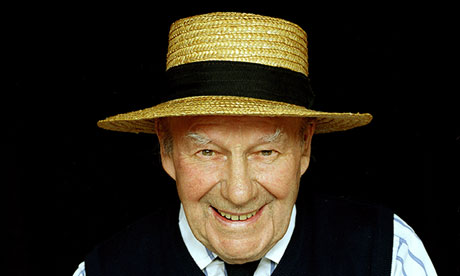For those of you who cannot keep still, this might be just the ticket.
Swedish company Pause Ljud & Bild is offering coffins complete with speakers and a streaming Spotify account to keep the tunes rocking in the grave.
For $30,000, audiophiles can jam all afterlife long in one of these special coffins, known as the CataCombo Sound System and featuring two-way speakers and a “divine” subwoofer.
Might even be enough to bring down the House of Usher
Category Archives: Music
Julian Bream on his legendary career: “I never listen to my own recordings!”
The legendary guitarist is announced as the winner of the Lifetime Achievement Award ahead of the star-studded ceremony at LSO St Luke’s, London, this evening.
Born in London in 1933, Julian was inspired to pick up the guitar by his jazz-loving father. He’s gone on to become an advocate for lute, bringing the instrument into public consciousness, as well as the classical guitar.
In conversation with Julian Bream: a Gramophone Milestones Podcast
During his long career Bream’s devoted commitment to championing the guitar enhanced its reputation as a concert hall instrument immeasurably, and his encouragement of composers has left the repertoire so much richer, something he continues to do today thorough his Trust. Gramophone editor Martin Cullingford met him at his home to talk about his musical life and career.
New Song-Tracking Software Could Be Great For Artists But Cause Headaches For Some YouTube Users
Musicians should get what they deserve for their work.
Souvenir programme
Probably John’s final official concert in Asia.
Thanks to Wong Yik Hung for this
Yet more Bach
Glenn Gould this time.
Bach, says Gould, was not so much ahead of his time as outside it. “For Bach, you see, was music’s greatest non-conformist, and one of the supreme examples of that independence of the artistic conscience that stands quite outside the collective historical process.” and
“Bach was the greatest architect of sound of all time”
Julian Bream: ‘I’m a better musician now than when I was 70’
Two years ago Julian Bream was walking with his retriever, Django, in the fields around his Dorset home, when a neighbour’s dog knocked him to the ground, breaking both hips and injuring his left hand. For several years, Britain’s greatest virtuoso of guitar and lute had played through the pain of arthritis, but these new injuries compelled him to renounce making music seriously. He had retired in 2002 after 55 years of professional performing, but still liked to give the occasional recital at churches or halls near his home.

Thus ended his longest affair, one that started when nine-year-old Julian put on one of his dad’s Quintette du Hot Club de France LPs and was seduced by what he calls the “burning anguish” of Django Reinhardt’s playing.
Reflexive Speed – Jorge Caballero
At last, some hints from Jorge, whose ease of execution and acute analytical mind I have always admired. Quite difficult to understand this concept intellectually, but you will get it if you try it.
This has been around for a little while now and I am hoping for a new lesson soon!
Thank you Jorge.

In the meantime, there is an interesting excerpt here.
Over-Practicing Makes Perfect | TIME.com
We don’t just need to learn a task in order to perform it well; we need to overlearn it. Sounds like a recipe for disaster? Depends on your approach. I have to constantly remind myself that practice is supposed to make performing a task easier, not more difficult!
Do read the whole article before jumping to conclusions!
Whenever we learn to make a new movement, we form and then update an internal model—a “sensorimotor map”—which our nervous system uses to predict our muscles’ motions and the resistance they will encounter. As that internal model is refined over time, we’re able to cut down on unnecessary movements and eliminate wasted energy.



